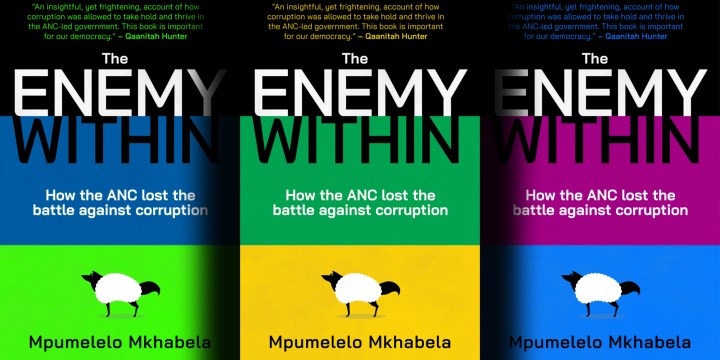BOOK EXTRACT
The Enemy Within — how the ANC lost the battle against corruption

In 2000, the ANC committed itself to ‘the new cadre’ project — a project to develop ANC members who are dedicated, selfless people who steer clear of corruption and embrace a new morality. Yet, 22 years later the ANC is consumed by corrupt cadres. What happened and why was the ANC’s ‘new cadre’ project such a complete failure? ‘The Enemy Within’ is published by Tafelberg.
Jacob Zuma scores high, compared with other ANC presidents, on his concerns about corruption. He made the largest number of anti-corruption mentions in a single January 8th Statement, the most important speech in the ANC’s political calendar.
In 2010, in his third year as party leader and second year as president of South Africa, Zuma announced his unwavering determination to fight corruption. At the ANC’s National General Council (NGC), the ANC’s mid-year assessment of its performance, Zuma urged delegates: “We must eradicate corruption as well as the perception of corruption.”
He pleaded with ANC comrades in government to implement the party’s promise to voters not to interfere in government procurement.
Tenders
“We must implement the provision in our election manifesto which states that politicians should not tamper with the adjudication of tenders. Basically, we must not allow tenders to destroy the ANC.”
On the role of his administration in the war against corruption, Zuma was apparently unequivocal, telling the ANC’s NGC he had established a Cabinet interministerial committee that was working with the public protector, the Special Investigating Unit (SIU) and the Auditor-General to tackle corruption. He said an anti-corruption task team led by the Hawks (the Directorate for Priority Crime Investigation) had been hard at work.
He put forward other ideas for tackling corruption, including the centralisation of procurement for major items, stricter penalties for service providers who obtained contracts illegally from the government, increased transparency and accountability in tender processes, and improved protection for whistle-blowers. All well and good, it seemed.
Visit Daily Maverick’s home page for more news, analysis and investigations
And Zuma wasn’t just all talk. The National Planning Commission he established to develop South Africa’s National Development Plan made fighting corruption a top priority. It stated that corruption cases had to be dealt with transparently and efficiently. Zuma signed off on the plan. In addition, among the directives — actual authority — he gave was for the SIU to investigate the unauthorised use of public funds, which invariably happens through corrupt means.
By 2018, his last year in office, Zuma had issued a record number of SIU proclamations, surpassing those of former presidents Nelson Mandela and Thabo Mbeki, to investigate and recover state funds irregularly obtained through corruption. A literal interpretation of all this would suggest that Zuma fought corruption harder than his predecessors. A more nuanced way of looking at it might indicate that corruption had been on an upward trajectory over time and the increased number of proclamations — just like the ever-increasing frequency and intensity of anti-corruption rhetoric — signified a continual failure to stop this trend.
‘Owned’ party members
The anti-corruption fight ran in conflict with, if not parallel to, various schemes of large-scale theft of public resources. At the 2015 NGC, Zuma expressed concern about internal party corruption: he referred to the existence of members who “belonged” to other members, not to the party itself. The “owned” members looked up to the people who had them in their pockets, not to the party.
“Another serious cancer that needs eradication in our movement is the existence of factions. Some of these factions are not based on ideological differences,” he complained. “They exist because of greed and the hunger for power which, once obtained, is abused to take control of state resources and to further business interests. The existence of factions and other tendencies tends to intensify in the periods leading up to elective conferences,” Zuma said.
The irony
Crispian Olver, an ANC veteran, found Zuma’s insight ironic. Not only could much of the factionalism in the ANC be traced back to Zuma’s bitter rivalry with Mbeki before the party’s conference at Polokwane in 2007, but Zuma himself had been repeatedly accused of corruption.
Olver then posed a question which is at the heart of the ANC’s failure to root out corruption: “How can ANC regional and provincial leaders be expected to toe the party line [on corruption] if the party’s national leaders do not bother to do so themselves?”
The question can also be asked of provincial and regional leaders in relation to leaders in lower structures such as branches. It can be asked of all ANC government leaders in relation to public officials in all spheres of government.
Finally, it can be asked of the entire hierarchy of state decision-making. DM
Dr Mpumelelo Mkhabela is a political analyst and columnist on News24. He is a former editor of the Sowetan and Daily Dispatch and a former parliamentary correspondent for City Press and the Sunday Times. He holds a PhD in Political Science.
















 Become an Insider
Become an Insider
Comments - Please login in order to comment.